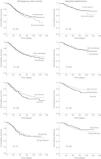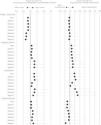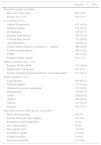To understand the perceptions of patients with heart failure (HF) concerning their disease, treatment and support, as well as the specialists who provide care after a decompensation, and to determine whether there is a relationship between the type of specialist involved in the follow-up and the medium-term prognosis.
MethodsA multicentre, prospective cohort study consecutively included patients with acute HF in the emergency department. The patients were interviewed by telephone 91–180days after their emergency department visit. We investigated the relationship between the type of specialist who performed the follow-up and the emergency department visits or hospitalisations using Cox regression models, with progressive adjustment by groups of potential confounders of these relationships.
ResultsWe interviewed 785 patients. Thirty-three percent (95% CI: 30–36%) considered their disease mild, 64% (60–67%) required help from third parties for daily activities, 65% (61–68%) had no recent therapeutic changes, and 69% (67–72%) received the same treatment in the exacerbations. The perceived support varied significantly depending on the factor under consideration (from greater to lesser: family, hospital, emergency department, health center, religion and patient associations; p<.05 in all comparisons). Thirty-nine percent (36–43%) of the patients with decompensations consulted directly with the emergency department, with no prior changes in treatment. At discharge, general practitioners (74%, 71–77%) and cardiologists (74%, 70–77%) were the most involved in the follow-up, although the specialty was not related to the prognosis.
ConclusionThere are various aspects of the perception of patients with HF concerning their disease that are susceptible to future interventions. Patient follow-up involves various specialties, but all achieve similar results in the medium term.
Conocer la percepción de los pacientes con insuficiencia cardiaca (IC) sobre su enfermedad, tratamiento y soporte, así como los especialistas que intervienen tras una descompensación, y si existe relación entre el tipo de especialista involucrado en el seguimiento y el pronóstico a medio plazo.
MétodoEstudio de cohortes multicéntrico, prospectivo, con inclusión consecutiva en urgencias de pacientes con IC aguda. Se entrevistaron telefónicamente los pacientes a los 91-180días tras la consulta en urgencias. Se investigó la relación entre el tipo de especialista que hacía el seguimiento y las visitas a urgencias u hospitalizaciones mediante modelos de regresión de Cox con ajuste progresivo por grupos de potenciales confusores de la relación de interés.
ResultadosSe entrevistaron 785 pacientes: un 33% (IC95%: 30-36%) consideraron su enfermedad leve, un 64% (60-67%) necesitaban ayuda de terceras personas para sus actividades diarias, un 65% (61-68%) no habían percibido cambios terapéuticos recientemente y un 69% (67-72%) perciben el mismo tratamiento en las agudizaciones. El soporte percibido varió significativamente dependiendo del factor considerado (de mayor a menor: familia, hospital, urgencias, centro de salud, religión y asociaciones de pacientes; p<0,05 en todas las comparaciones). El 39% (36-43%) de pacientes con descompensaciones consultaron directamente a urgencias sin modificaciones previas del tratamiento y, al alta, el médico de cabecera (74%, 71-77%) y el cardiólogo (74%, 70-77%) fueron los más involucrados en el seguimiento, aunque la especialidad no se relacionó con el pronóstico.
ConclusiónExisten diversos aspectos de percepción del paciente con IC respecto a su enfermedad susceptibles de futuras intervenciones. El seguimiento del paciente involucra a diferentes especialidades, pero todas consiguen resultados similares a medio plazo.
Article
Diríjase desde aquí a la web de la >>>FESEMI<<< e inicie sesión mediante el formulario que se encuentra en la barra superior, pulsando sobre el candado.

Una vez autentificado, en la misma web de FESEMI, en el menú superior, elija la opción deseada.

>>>FESEMI<<<











